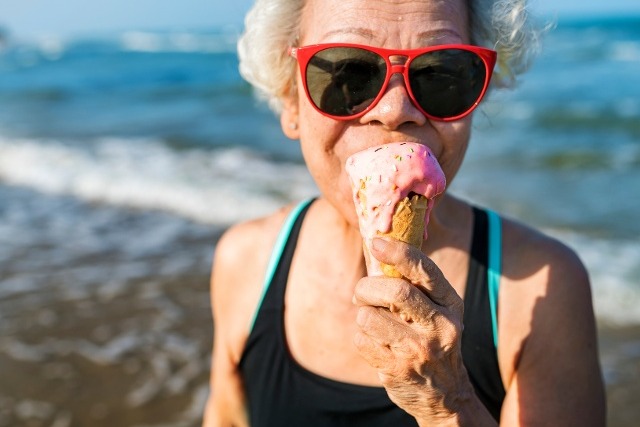 Getting outside and enjoying summer can be great, but be sure that health and safety remain top of mind to make the most of you or your loved one’s fun in the sun! Heat and sun exposure can have serious impacts on anyone's health, especially for seniors. As an adult ages, their body’s ability to adapt their internal temperature declines. Because of these changes in the body, closely monitoring the weather when planning outings in the summer is a very good idea. Here are some additional tips to ensure you or your loved one can enjoy summer safely.
Getting outside and enjoying summer can be great, but be sure that health and safety remain top of mind to make the most of you or your loved one’s fun in the sun! Heat and sun exposure can have serious impacts on anyone's health, especially for seniors. As an adult ages, their body’s ability to adapt their internal temperature declines. Because of these changes in the body, closely monitoring the weather when planning outings in the summer is a very good idea. Here are some additional tips to ensure you or your loved one can enjoy summer safely.
1. HYDRATION MATTERS
Keeping a cool water bottle on hand whenever venturing outdoors is a must, especially in the summer. Water plays an active role in maintaining a person's overall body temperature. That is why you feel thirsty after spending time outside. It’s your body’s way of signaling that it needs help cooling down. As you age, your body’s thirst signal begins to diminish. A senior may not realize that they need water because they do not have the sensation of thirst like they once did.
Setting a timer on a watch or phone is a great reminder. As a general rule of thumb, a person should drink one-third of their body weight in fluid ounces a day. Say you weigh 150 pounds, then you should aim to drink 50 ounces (6 ¼ cups) of water each day. However, considering medical histories and prescriptions,it is best to consult with your doctor to determine how much water you or your loved one should be drinking daily.
2. BE AWARE OF SUN EXPOSURE
When out in the sun, it is very important to take the necessary precautions to avoid getting sunburned or overheated. The Skin Cancer Foundation recommends wearing sunscreen with at least a 30 SPF (Sun Protection Factor) when outdoors. Staying in the shade when at all possible is even better as the sun is powerful and can cause painful burns. To avoid potential sunburns, remember to reapply sunscreen every two hours.
3. DRESS FOR THE WEATHER
Sunscreen isn't the only form of protection available against the sun. Wearing "sun protective" clothing that has Ultraviolet Protection Factor (UPF) can block the sun's rays, too. Wearing light weight, flowing clothing is also a good idea. Sunglasses and wide brimmed hats are additional accessories to sport while out in the heat. These can be fashionable and practical!
4. CHECK FOR PRESCRIPTION SIDE EFFECTS
Some medications make people more sensitive to the sun. Most prescriptions have a label indicating if extra precautions are needed to take when using them. This does not mean you have to forego outdoor activities, just be sure to follow the suggestions from your doctor or pharmacist to avoid any problems.
5. COOL DOWN WHEN NEEDED
Staying in tune with the way your body feels when outdoors is important. If you or your loved one begins to feel uncomfortable in the heat, it's a good time to relocate indoors. Taking a lukewarm shower or bath is a fast way to bring your body temperature back down to normal. If you live in a regularly hot environment (take Arizona, for example), then schedule outside time during the parts of the day where the sun is at its lowest, like the mornings and evenings.
6. KNOW THE SIGNS OF HEATSTROKE
Seniors are at a higher risk of heat-related illness due to health factors such as poor circulation, heart disease, high blood pressure, and the inability to perspire due to certain medications.
Because of this, people older than the age of 65 have an increased risk of heatstroke. Caused by prolonged exposure to high temperatures, heatstroke is hallmarked by an abnormally high body temperature and a sudden change in behavior (confusions, agitation. etc.). Some additional symptoms to be aware of include:
- Heavy or labored breathing
- Rapid pulse
- Nausea and vomiting
- Fainting
- Dry, flushed skin
- A body temperature higher than 104 degrees
Knowing the signs and symptoms of heatstroke can be lifesaving. Heatstroke and other temperature related ailments can be avoided altogether by drinking plenty of water, wearing the appropriate attire, being aware of sun exposure, knowing personal prescription side effects, and recognizing when it is time to cool off. With these few things in mind, you and your loved one are destined to have a fun and safe summer!

